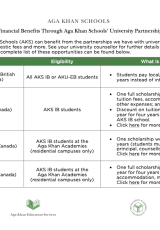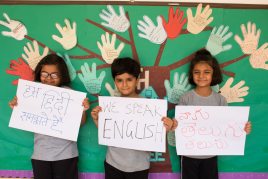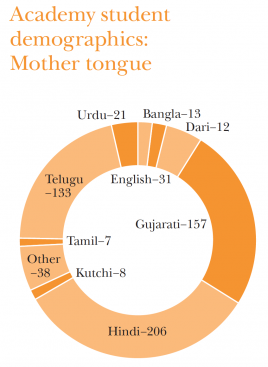Ensuring proficiency in global and local languages
In a bid to empower students to value and preserve their traditional cultural heritage, the Aga Khan Academies instituted a bilingual programme in all its network schools in 2008.
“The Aga Khan Academies, wherever they exist, will follow a dual-language curriculum. They will teach in English in order to connect to global society. And they will also teach in the appropriate local language...Because they will be fluently bilingual, our students will be prepared to unlock the rich treasure chests of history and culture, art and music, religious and philosophical thought, which are integral to one’s identity and one’s values,” His Highness the Aga Khan said at the Foundation Stone-laying Ceremony of the Aga Khan Academy Dhaka, Bangladesh, on 20 May 2008Alexandra Holland, Curriculum Development Manager at the Academies, echoes His Highness, saying the “concept of monolingualism, or knowing only one language, is outdated.”
Proficiency in one’s mother tongue, according to Alexandra, touches every aspect of our lives and it is absolutely essential and necessary to promote and preserve local traditions and thoughts in modern society, which can sometimes sideline the significance of local traditions and cultures.
Atika Mula, a student at the Academy in Mombasa, says, “It is important to learn other different languages because in Mombasa, many people speak Kiswahili so if you learn the language, you will be able to communicate with many people.”
However, implementing a uniform dual language policy across the network of Academies has its challenges. Hyderabad, where students enter the school proficient in a wide range of languages, serves as a prime example of the complexity of instituting the bilingual programme.
The graph below illustrates the diversity of languages of students at the Hyderabad Academy.
“The diversity of language profiles in Hyderabad means that the Academy is now working toward offering students the opportunity to access the bilingual programme in a range of languages,” says Sreelatha Kumar, Principal of the Junior School at AKA Hyderabad.
In Hyderabad the diversity of languages spoken has led to a variety of languages being offered in Senior School years. Students are working towards bilingualism in Hindi, Telugu, Bangla, Dari and Russian.
In Mombasa, incoming students are often more fluent in the English language than in Kiswahili, which means students need to strengthen Kiswahili skills in the early years. Therefore, in Mombasa, the curriculum is taught in English and Kiswahili on alternate days to lower primary school students and then switches to a trans-languaging approach in years 4 and 5. In this approach, students construct their understanding of a topic through the use of both languages, for example they may read about a topic in English and present their findings in Kiswahili. Mombasa also offers French to Senior School students, given the prominence of French in the central and western parts of Africa.
The Trans-languaging approach to teaching is also used in Maputo, where the student body is divided between those who speak English and those who speak Portuguese as their dominant language.
Shaan, a sixth grader at the Academy in Maputo, reflecting on his experiences with language learning, says, “Working with two languages is always important and that is what we are doing …the more languages you learn, the more informed you are."
The video below, illustrates the mixed language profile of students at the Academy in Maputo.
Maputo, like the other Academies, has a diverse language profile. A conscious and deliberate effort is made to ensure that all the Academies will develop a programme suitable for their context to achieve the same goal of creating students who are bilingual in English and a national language.
In addition to preserving local languages and cultural heritage of the student bodies at the Academies, learning more than one language has other advantages. Research has shown that bilingualism can give significant cognitive benefits, including higher levels of executive function. Furthermore, people with multiple language skills are more receptive to understanding others’ differing points of view. Additionally, having dual language skills makes it easier to learn additional languages in the future, even if the new languages are completely different from those the student already speaks.Alexandra emphasizes the importance the Academies put on the dual language approach – she says if it prepares students to successfully face challenges in an ever-shrinking global village, then that would be a mission accomplished:
“The globalized environment of today’s world requires fluency in more than one language, as people of different nationalities and linguistic traditions come into increased interaction.”
The dual language programming addresses the realities of today’s world and allows students to maintain the important connection with their home countries. With this preparation through the dual language approach, the Academies are fostering true home-grown leaders with the skills, capacities and desires to make a significant and positive difference in their countries.
Alexandra explains: “The bilingual programme ensures that students have deep connections to their local context and culture. Allowing students to engage with their community in their own language, building an authentic understanding of its heritage and traditions, is vital to maintaining strong links with their home. This gives Academies students the understandings and skills needed to contribute meaningfully to the development of their community, both now and in the future.”
By Perviz Walji and Farhan Karim
Newsletter readers please click here to return to the newsletter (browser version)
publications






